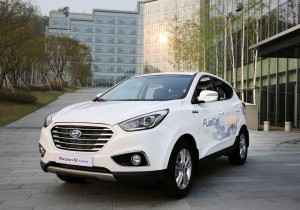- California Assembly OKs highest minimum wage in nation
- S. Korea unveils first graphic cigarette warnings
- US joins with South Korea, Japan in bid to deter North Korea
- LPGA golfer Chun In-gee finally back in action
- S. Korea won’t be top seed in final World Cup qualification round
- US men’s soccer misses 2nd straight Olympics
- US back on track in qualifying with 4-0 win over Guatemala
- High-intensity workout injuries spawn cottage industry
- CDC expands range of Zika mosquitoes into parts of Northeast
- Who knew? ‘The Walking Dead’ is helping families connect
S. Korea aims to have over 1 mln eco-friendly cars by 2020
SEJONG (Yonhap) — South Korea will seek to have more than 1 million eco-friendly cars on the road by 2020 as part of its plan to reduce greenhouse gas emissions and generate new growth momentum for its auto industry.
The 2016-2020 plan will push up the percentage of green cars such as hybrids, plug-in hybrid electric vehicles (PHEV), pure electric vehicles (EV) and hydrogen fuel cell cars sold in Asia’s fourth-largest economy, to 20 percent of all sales, the Ministry of Trade, Industry and Energy said.
“The goal is to create a full-fledged market for eco-friendly cars by 2020,” it said.
This is much higher than the 2 percent market share that is expected to be reached this year, and calls for annual output to grow to 920,000 units per year in 2020, from just 80,000 vehicles this year.
The ministry said such changes can reduce the amount of greenhouse gases released into the atmosphere by 3.8 million tons per year, up significantly from the 200,000 tons worth of cuts expected for this year.
It also said the country will inject some 150 billion won (US$127.5 million) into research and development (R&D) to build globally competitive cars which can help create a 18-trillion won export market.
“R&D emphasis will be placed on battery performance, electric drive systems and better climate control for vehicle occupants,” it said.
R&D could double the battery pack capacity from the current 27 kilowatt-hour (kWh) to 54 kWh, with energy intensity of electric motors to improve by 10 percent.
Future cars will be 50 percent more efficient in terms of power used to operate heaters and air-conditioning which directly impact vehicle performance. This translates into overall performance of green cars rising 2.5-fold compared to the present.
Better cars can raise overseas demand from about 50,000 units this year to 640,000 in 2020, and place the country in a good position to take advantage of the steady rise in global sales, the ministry said.
“In the past five years, eco-friendly cars sales have been growing 20 percent annually, which is six-times faster than growth reached for conventional motor vehicles,” the ministry said. “By 2030, roughly half of all cars sold around the world will be eco-friendly cars.”
Higher volume production is also expected to give eco-friendly cars better price competitiveness vis-a-vis conventional vehicles and reduce the technology gap between South Korean carmakers and those in countries like Japan and the United States that are leading the hybrid-power, green car market at present.
The price competitiveness of green cars stands at 44 percent of internal combustion engine cars, as of this year, with this number to improve to 72 percent in 2020, and reach parity around 2025.
Local carmakers whose technology is estimated to be stand at 93 percent of global leaders will be able to reduce the gap to 96 percent in 2020 and be on par five years later.
The government’s plan, in addition, calls for building the necessary infrastructure to meet demand by building some 1,400 recharging stations across the country by 2020 for EVs and 80 hydrogen filling stations for hydrogen fuel-cell vehicles.
These numbers are significantly higher than 487 EV recharging stations 13 hydrogen filling stations to be set up by 2016.
To further generate demand, the government plans to extend state subsidies for people that buy eco-friendly cars. For next year subsidies for hydrogen cars will hit 27.5 million won per unit, with numbers falling to 12 million for EV and 1 million for hybrids.

















Pingback: 1 Million ‘Green Cars’ on South Korean Roads By 2020 » vehicle News | vehicle News
Pingback: 1 Million ‘Green Cars’ on South Korean Roads By 2020 - All Car News Australia
Pingback: Be Environmentally Friendly | Welcome to our website
Pingback: Volume Of Hydrogen Gas At 1 Atm | transaction - worldwide atms
John Bailo
December 21, 2015 at 2:09 PM
South Korea is to be congratulated for both its leadership in deploying stationary fuel cell plants and also creating a practical production FCEV, the Hyundai Tuscon.
radiator
September 22, 2017 at 3:30 PM
Planet Ark – World Environment News